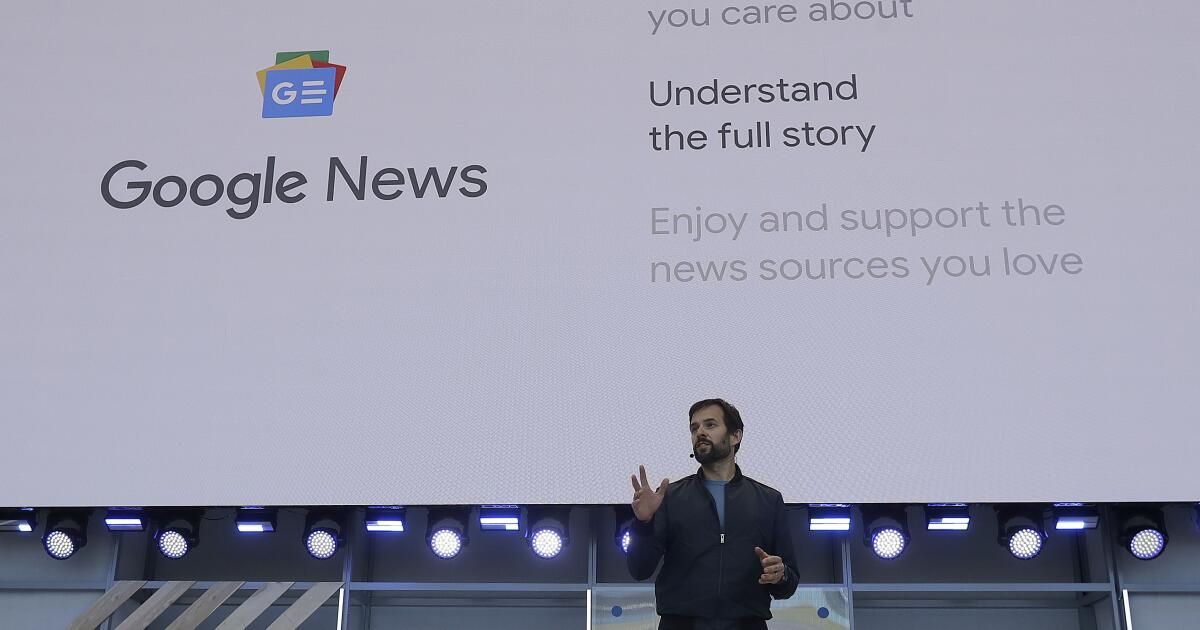California lawmakers intend to shelve legislation that would have Forced Google to pay media outlets to distribute its content, and instead announced a new public-private partnership between the state and the tech giant that will fund programs to research artificial intelligence and strengthen local journalism.
The plan calls for a commitment of nearly $250 million over the next five years, with a quarter coming from state taxpayers and three-quarters from Google and possibly other private donors. The money will go toward two new initiatives run by the University of California, Berkeley’s Graduate School of Journalism: a fund to distribute millions of dollars to California news outlets and an “AI Accelerator” to develop ways for journalists to use the powerful technology.
“This agreement represents a major step forward in ensuring the survival of newsrooms and strengthening local journalism across California, leveraging significant resources from the tech industry without imposing new taxes on Californians,” Gov. Gavin Newsom said in a statement. “Not only does the agreement provide funding to support hundreds of new journalists, it helps rebuild a strong and vibrant press corps in California for years to come, reinforcing the vital role of journalism in our democracy.”
The deal marks the culmination of a two-year battle between the news industry and the technology sector over how to resurrect local journalism amid massive changes in how people consume news and how advertisers reach consumers.
Assemblywoman Buffy Wicks (D-Oakland) spearheaded the effort, arguing that supporting California journalism is essential to maintaining democracy because local media outlets play a vital role in informing the public about their government. Declining advertising revenue has caused many media companies to lay off journalists or close their doors entirely. leaving some communities without independent oversight bodies provided by local media.
“This partnership represents a cross-sector commitment to supporting a free and vibrant press, empowering local media across the state to continue their essential work,” Wicks said in a statement. “This is just the beginning. I remain committed to finding even more ways to support journalism in our state in the years to come.”
The debate over how to resolve the issue fractured the newspaper industry, with traditional publishers supporting a bill that digital outlets did not and the union representing journalists opposing the negotiated deal. Politicians found themselves caught between the divided journalism community and the powerful tech sector, a major contributor to California’s economy.
As part of the agreement, the state will contribute $30 million of next year’s budget to the fund and will contribute $10 million in each of the next four years. Google will contribute $15 million to the fund and pay another $15 million to support other journalism initiatives, including the AI accelerator and direct donations to digital media outlets. A new nonprofit will be formed to manage the programs at UC Berkeley, with a board made up of representatives from across the California industry.
“This public-private partnership builds on our long history of working with journalism and the local news ecosystem in our home state, while developing a national center of excellence in AI policy,” said a statement from Kent Walker, chief legal officer of Alphabet, Google’s parent company.
The agreement has the support of several professional associations representing editors and media outlets, but not of the union representing journalists.
Matt Pearce, president of the Media Guild of the West, criticized the plan in emails sent to union members in recent days, calling it a “complete defeat for the state's attempts to curb Google's dominance of our newsrooms.”
The union had pushed for the agreement to include a provision requiring media companies receiving the funds to have a collective bargaining agreement in place and for Google to contribute more than anticipated. 74 million dollars paid annually to newsrooms in Canada.
As part of the deal, Assemblywoman Buffy Wicks (D-Oakland) agreed to drop legislation she has championed for the past two years.
Assembly Bill 886 Also known as the California Journalism Preservation Act, it sought to mitigate the financial hardships that have plagued the news business as Google and Meta grew to dominate digital advertising and technology radically changed the way people consume news. Sponsored by the California News Publishers Association, of which the Los Angeles Times is a member, the bill touched off a fierce battle between news organizations and Big Tech.
Publishers argue that online search and social media platforms are unfairly gobbling up advertising revenue while publishing content they don't pay for. The bill would have required Google to pay into a fund that would in turn distribute millions of dollars to California news outlets based on the number of journalists they employ. The amount of the payment was never specified in the legislation, though lawmakers were Hope that Google and the news business can negotiate An agreement.
But Google argued In testimony before the Legislature earlier this summer, he said the bill would “break the fundamental, foundational principles of the open Internet by forcing platforms to pay publishers for sending them valuable, free traffic.”
Google threatened to remove California news content from its platform if the bill passed and then ran ads saying the legislation would reduce Californians' access to news.
Lobbying on the bill intensified, with a trade association that Google belongs to launching an advertising campaign targeting lawmakers that portrayed the legislation as a giveaway to big media corporations. Records show the Computer and Communications Industry Association spent $5 million on ads against AB 886 over the past two years as the bill moved through the Legislature.
The most recent version of the bill was Based on similar legislation in Canadawhere is google paying $74 million annually into a fund for the news industry. The California bill would have been the first such law in the United States.
This year, lawmakers also considered a different bill that sought Help the news industry by providing a tax credit. to employ full-time journalists. Senate Bill 1327 would impose a new tax on Amazon, Meta and Google for the data they collect from users and invest the money from this “data extraction mitigation fee” into tax credits for news organizations.
As a fiscal measure, it required approval by two-thirds of the Legislature, presenting a political challenge in an election year.












